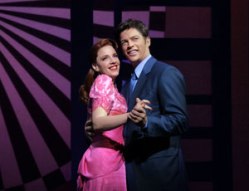Review: On a Clear Day You Can See Forever

In the musical On a Clear Day You Can See Forever, we learn that the central character experienced a past life and suffered an untimely end, only to be reborn in a new incarnation. Such is the case, too, with this 1965 musical by Burton Lane (music) and Alan Jay Lerner (lyrics and original book), which is now being given new life in a revival starring Harry Connick Jr. and featuring a completely rewritten book by Peter Parnell. Unfortunately, history is likely to repeat itself--like its previous version, this Clear Day suffers from an unworkable book. The only difference is that it’s unworkable in a completely new way.
In the original, which starred John Cullum and the great Barbara Harris (both received Tony nominations, as did the score), a psychiatrist takes on a new patient, Daisy Wells, who has the gift of ESP and who under hypnosis reveals that she is the reincarnation of a free-spirited 18th century woman named Melinda Wells. The shrink soon falls in love with Melinda, much to the consternation of Daisy, who by then has fallen for him herself.
Not surprisingly, this silly scenario received a proper drubbing from the critics, and despite its lovely score the show ran a mere 280 performances. Nor did the property fare much better when it was made into a 1970 movie starring Barbra Streisand and Yves Montand.
Director Michael Mayer’s re-conception, set in 1974, provides a gender change for Daisy, who is now David (David Turner), a 29-year-old gay florist with commitment issues. In his past life he was a 1940s-era female jazz singer (still named Melinda Wells), and it is her with whom Dr. Mark Bruckner (Connick) falls in love. Meanwhile, David, despite the fact that he has a gorgeous boyfriend (Drew Gehling), finds himself falling for the shrink, who fails to inform his patient that the reason for their countless hypnosis sessions is so he can spend more time with Melinda.
Needless to say, this lends a fairly complex spin to what was already an outlandish scenario. Bruckner, who is now the show’s main focus, somehow falls for Melinda even though she’s embodied by David. (Of course, the audience sees what he sees, namely the lovely actress/singer Jessie Mueller as Melinda.) In one of the more bizarre musical numbers, he dances with both David and Melinda, in a sort of choreographic ménage a trois.
To say that this doesn’t work is an understatement. Not helping matters is that Connick doesn’t begin to have the acting chops to pull off what would be a challenge for even the most experienced actor. Most of the time, except of course when he’s singing, he looks awfully uncomfortable onstage, and when the moment comes when he’s about to kiss his male co-star it’s clear that the curtain can’t come down fast enough.
Turner is another problem. His fussy, mannered performance lacks the required charm, and he doesn’t have the voice to pull off such powerful numbers as “What Did I Have That I Don’t Have?” On the other hand, Mueller, a Chicago performer here making her Broadway debut, does nicely by Melinda, and infuses her jazz-tinged numbers with real feeling. Of the rest, Sarah Stiles steals her scenes as David’s BFF; Drew Gehling displays a killer voice on such songs as “Love With All the Trimmings”; and Kerry O’Malley makes the most of her thankless role as the shrink’s colleague who’s secretly in love with him.
Director Mayer handles the show’s physical complexities—the action frequently shifts back and forth between 1974 and 1944, with David suddenly transforming into Melinda—with his usual professionalism. But the look of the production is godawful. You can’t blame Catherine Zuber’s costumes, which are hideous, but then again pretty much all clothes from that era were. But Christine Jones’ set--featuring a profusion of pop-art style graphics and a garish color scheme that looks like an explosion at a paint factory—is a true eyesore.
Fortunately, the gorgeous score provides plenty of compensations, especially when it’s being sung by Connick in his heartthrob style. Augmented here by a couple of numbers written for the movie and others taken from the score of the film “Royal Wedding,” it’s a consistent delight. When Connick belts out the dynamic “Come Back to Me” or croons the gorgeous title number, almost, if not all, can be forgiven.
St. James Theatre, 246 W. 44th St. 212-239-6200. www.Telecharge.com.
| Print article | This entry was posted by Frank on 12/12/11 at 05:21:26 am . Follow any responses to this post through RSS 2.0. |